Golden Time (2013) Review: A Refreshingly Real Tug at the Heartstrings
Romantic comedies ride on a very narrow set of tracks. With limited settings, character archetypes, and plot progressions, it’s easy to see why people often adopt the “if you’ve seen one, you’ve seen them all” mentality when approaching the genre. That being said, every once in a while, buried underneath a mountain of anime that all lookalike, a gem is found. In this case, it seems the anime industry struck something closer to gold.
The Production
Golden Time is produced by J.C.Staff, producer of many other notable anime series, including A Certain Scientific Railgun (2010), Aoi Hana (2009), Toradora! (2008), and Zero no Tsukaima (2006). J.C.Staff’s reputation as a prolific animation studio particularly shines in scenes in which there are performances or constant motion. Though the quality isn’t quite up to par with the best of Kyoto Animation or Bones, the animation is fluid and smooth, a solid job by any standards. J.C.Staff also sticks with their easily recognizable art style that they’ve stuck faithfully to ever the success of Zero no Tsukaima. The art strikes a moderate balance between overly moe and boringly realistic, able to please fans of both styles. The soundtrack was composed by Yukari Hashimoto, renown for her work on Mawaru Penguin-drum (2011). Though her work for Golden Time doesn’t quite stack up against some of her previous endeavors, it’s still an overall great track list that never fails to correctly interpret the mood.
The Plot
I’d rather not provide any spoilers here. The series revolves around a group of friends and their experiences in living an independent life. They go through romantic troubles and obstacles with platonic relationships, introspective issues and material trials, learning about what it is to be human and alive in the present. The story primarily focuses on the life of Tada Banri and his relationship with Kaga Kouka, his to-be girlfriend, but shifts the focus to other side characters fairly often. Overall, the plot is interesting, but what makes it exceptional is that it’s paced in a way that each episode leaves you wanting to watch the next.
It’s easy to get frustrated when navigating through the romance genre. There’s rarely a conclusive decision when it comes to romantic relationships, and when there is, it’s usually only shown at the end. This is the reason that shows such as Clannad: After Story have such appeal: they explore relationships following a successful union. Golden Time also starts close to the beginning of a newly formed relationship and takes it from there, and that’s really where the romance starts in any story, fictional or real.

The realism is prominent in each episode. I noted that the naturalistic development of characters was a big plus, and the same applies for the story. Each episode shows the characters engaged in a constant game of tug-of-war, living life to the fullest only to be brought back to new lows and dealing with the consequences of being alive. Even the romance is painstakingly real, with characters experiencing breakups and finding new love in a manner grounded in reality.
The series is also one of the few to successfully utilize a majorly overused and jaded plot device: amnesia. Amnesia is probably as cliche things go, but it’s rare to see it used for anything other than an excuse for starting characters off on a blank slate. Golden Time really milks Tada Banri’s status as an amnesiac, extracting every last aspect of his condition and giving each facet meaningful character interaction. His condition isn’t a simple ailment; it’s a necessary trauma that the whole story revolves around. But most importantly, it’s unintrusive. How enraging is it to be completely engrossed in a series when a character with amnesia most conveniently forgets some crucial piece of information, only realizing he/she forgot at that moment? It’s disruptive and draws the ire of every anime fan, but Golden Time avoids this somehow, all the while crafting the story to revolve around this one single aspect of a character.
The Characters
In the beginning, Golden Time seems to carry the typical overused stereotypes that romance works are notorious for. We have our protagonist, Tada Banri, seemingly meek, indecisive, and nice to everyone he sees. He seems like another guy who’s dense to the feelings of everyone around him but manages to win their hearts, a natural gigolo. From there, the rest seems to proceed as it does in most anime. We get introduced to Yanagisawa Mitsuo, our protagonist’s to-be best friend that’s generally a bit more badass than the protagonist. We meet the necessary pink-haired loli type, Oka Chinami, and the essential nerdy geek obsessed with all things concerning the second dimension, Takaya Sato, or as he’s affectionately referred to as, 2D-kun. The production company, didn’t slack on the nurturing sister-type friend either, with the role going to Banri’s high school friend, Hayabashi Nana, or Linda. And it’s a sin to forget the strong-headed, slightly strange, energetic one, embodied by Kaga Kouko.
After the introductions, however, Golden Time decides it’s time to run on its own tracks instead of following the ones already set. Almost none of the characters develop in ways commonly seen in the romantic comedy genre. The fact that the pink-haired loli becomes more than a pink-haired loli is a testament to the changes the series makes to established character archetypes and development paths. The most prominent example of this can be found when examining Tada Banri. Too often, protagonists retreat into a corner, becoming vague and indistinct from the supporting cast (I’m looking at nearly every single romantic comedy in the past decade). As the audience is exposed to Banri’s learning experiences and is fed his past, he grows in importance instead of fading away into oblivion, and he’s given new struggles that bring out traits of himself that allow him to evolve. This pattern is uncomfortably rare in romantic comedies, and it’s refreshing to see a male protagonist seeing the sun instead of roaming in the shadows.
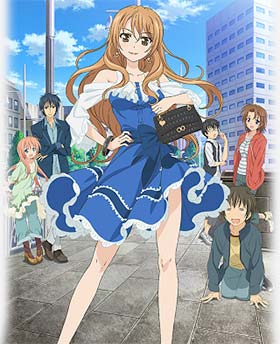
Unique character development is nice and all, but it’s an entirely different matter to build on them in a way that creates a more enjoyable character, and this is Golden Time‘s biggest strength. The cast, as previously mentioned, starts off as the boring standard that most romance anime utilize, but they all develop in ways that positively contribute to the story. The geeky 2D-kun eventually becomes the group’s unrecognized core. He’s the mediator when fights erupt, the one who calls for group gatherings, the one who always has everyone’s backs in times of hardship. Sato starts as the typical snobbish “2D is superior to 3D”, but is as interactive with the real world as his friends.
Something to note here is that this is (as far as I know) how a normal otaku interacts with life. Unless physically disconnected with the physical world, an otaku is as human as can be, and this encompasses having friends and having a social life, albeit one that most people aren’t familiar with. Sato isn’t the stereotypical shut-in otaku that despises life away from his computer screen, and that leads to a very pleasing attribute about the series.
The cast of Golden Time feel human and act in ways any of us might react in a given situation. With the exception of a couple of quirks that otherwise keep them from blending into oblivion, many of the traits, difficulties, and personalities of the main characters are fairly realistic. Banri struggles with displacing his old identity while developing his own. Kouko learns to deal with her obsessive personality. Even our sweet pink-haired loli endeavors to cope with her jealousy. None of them are necessarily bad or perfect, and they struggle with normal problems.
The Romance
I was completely engrossed in the romantic relationship between Banri and Kouko. This is a complicated and formal way of saying I’ve never been such a big fanboy while watching an anime. As tween girls scream and react to Justin Bieber, I too yelled and gasped with each episode.
In all seriousness, it’s very hard not to get taken in by the interactions between Banri and Kouko and various other romantic rivals for a multitude of reasons. As previously mentioned, the series starts close to the beginning of their relationship. It’s uncommon to see an anime that explores the crests of joys and the valleys of hardships after a relationship has started, but doing so opens up so many new doors. Not to say that the path that led to the start wasn’t exciting. The story that ends in Banri confessing his feelings is as comprehensive and nerve-wracking as other anime who spend an entire season focusing on the journey. But the events that happen after that really create an immersive experience.
Another factor that allows for greater enjoyment is the fact that our characters are in college. No pesky parents or high school teachers to get in the way of life. High school romance is always severely limited by the fact that most high school students are still bound to their house and school. This means that characters are always defined by their relationships, be they family, faculty, or location. This isn’t so in Golden Time because becoming a college student implies freedom from the many chains that have restricted movement just a year prior. Banri and Kouko don’t always meet in classes or on campus. Their peers aren’t the primary source of interference, nor are their parents or teachers. Their romance is unaffected by the factors that define so many younger relationships.

It’s also interesting to see the romance of side characters have a significant impact on the plot. Such romantic exploits are typically relegated the status of a side-story without much canonical impact, but the exploration of love outside of the two main protagonists’ in this particular series adds a dynamic balance to the story, one that could tip at the slight provocation, adding a very real element of characters having to check themselves at the risk of ruining the relationships they hold dear. Neither is it a superficial balance either (i.e. “You liked the girl I liked so we can’t be friends”), but as with platonic connections in real life, it is a complex and intricate state. Everything characters do interact in some way with this balance, and Golden Time does so in a way that’s deep and pliant.
There are smaller reasons that lead to a satisfying romantic tale, details such as character and plot development, but what really breathes fresh air into this particular series are the reasons listed above.
The Cons
No series is perfect, and Golden Time has its own fair share of flaws.
Though the characters are mostly well-developed, there’s hardly any exploration of anyone’s past other than Banri’s. There’s no real explanation for Kouko’s obsessive personality, other than she was “born with it”. Oka Chinami carries around a camera she calls “Okamera“, documenting her life and the adventures of her friends and club members. Though there are hints of why she does this, it’s never explicitly unveiled. There is a lot of potential for expanding on other characters, and the production staff never exploits this potential. It doesn’t detract from the story, but doing so would definitely have created an even more well-rounded cast and a richer experience overall.

Also, there’s one annoying character that just doesn’t belong: Banri’s ghost. Banri’s ghost is essentially his consciousness from before Banri’s accident that induced amnesia. Cowardly, irrational, overly-dependent, xenophobic, quick to panic, vindictive, and just straight up annoying, Banri’s ghost is anti-thematic, unnecessary, and ridiculously pesky. In a series that does an excellent job of establishing a sense of reality, this single figment of fantasy doesn’t belong. Anything that this spiritual presence does would be better attributed to something else. There is an instance in which Banri and his friends come back from a trip to the beach. Tired, Kouko falls asleep at the wheel, and though the crew is safe, everyone is shocked and burdens themselves with unnecessary guilt. This could have been a short arc on learning to take responsibility and dealing with harder life circumstances. It fits with the overall theme of the anime because it embodies the phrase “it’s life.” However, all of this is brushed aside and all credit for the experience is given to — wait for it — Banri’s ghost, who apparently hexed Banri for refusing to go after the girl of his (the ghost’s) dreams. This questionable decision to include such a character is one of the biggest problems I had with the anime.
And then there’s the ending. The infamous and notorious “bad ending” that bring so many people to their knees. The one thing that condemns or acquits a great anime. There will always be those who complain about a series on the basis of an anime’s lack of a impactful ending. Unfortunately, Golden Time happens to conclude in a not-so-stellar way. If the pacing is ever off in this series, it’s at the last episode. Everything feels so rushed and the setting changes so quickly that it completely warps any feeling of realism in the series. The return of Banri’s ghost in what was supposed to be a metaphorical “embracing one’s past” moment also works against a meaningful resolution, only inciting past hatred of the pest and forcing something that could have come naturally without the physical representation of Banri’s past. Most of all, the ending was just plain unsatisfying. There was no struggle to endeavor, no obstacle to be surmounted, no effort to be made. It just ended. Though objectively, Golden Time‘s ending was befitting of its title, it went out with a squeak instead of the bang I had expected.
Despite its flaws, Golden Time does a lot of things right. Its realistic view of the world and its inhabitants really bring out something innovative in a genre where change seems inhospitable. The romance is captivating, the characters aren’t flat or shallow, and the experience overall is very satisfying. The plot is paced such that it’s impossible to put away the series midway. Though there’s a lot of untapped potential, the series still captures the best of the romantic comedy genre. If you enjoy romance anime at all, I highly recommend you pick this one up.
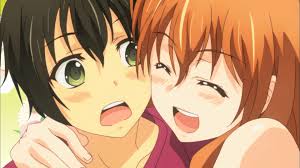
The ending though, is a different story. I could write an entire article on how to make the ending better, but that’s for another time. Spoiler alert (look away if you haven’t watched the series yet): Banri loses his memories again, reverting to his consciousness from before he started attending college. Kouko comes back, prompting a recall of his memories from college, and he gets back together with his beloved. In the end, Golden Time still manages to encapsulate the standard romance anime ending. Here’s a bit of trivia: Golden time is a time in photography immediately after sunrise or preceding sunset such that the sun that casts a golden glow on the landscape. Does Banri’s relationship mark the end of his journey or the start of a new one? Who knows, but it’s a golden time regardless.
Rating:
What do you think? Leave a comment.








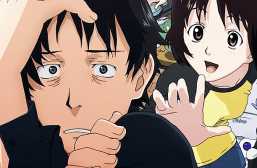
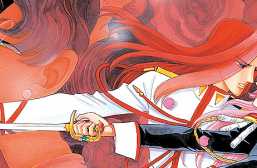
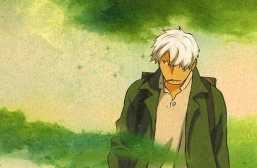
I didnt like it at first but now this is pretty much my favorite Anime. Its just that damn good.
Very nice review. Anime is worthy of 4 and a half rating.
This is my new favorite romance anime. I don’t think any other romance animes can beat Golden Time on my list of romance animes. This is the 3rd anime that has made me cry so much. Thank god whoever made the anime.
I just started watching this recently for 4 episodes straight. I gotta say, this is probably one of the best if not the best romantic comedy anime I had ever seen:) I really love the story of this anime. This kind of reminds me of Toradora, but this is just so much better becuase it is a college anime and I am at that point where I too go to college!
that’s what I thought when I haven’t episode 9. after watching episode ten onwards all I can say is I can literally imagine the writer reading his novel in an annoyingly sarcastic way while watching the anime.
feeling emotional and overjoyed at the same time after watching Golden Time, what an amazing anime!
This show rivals Toradora! as my favorite romance anime and almost is in league with Clannad.
this anime is getting too real to the point where only mature people can understand this, in addition some of the plots are ridiculous (people who understand this anime can relate to the emotional burdens,however the random scenes of forced cuteness,randomness,and awkwardness literally blows the romance topic) , I’m not watching the anime anymore because it has lost a lot of its enjoyability.(awkward romance that you can’t understand or is highly unrealistic) we got better things to do… seriously [example]: golden time episode 19 scene at 10:05, seriously wtf am i watching? if the romance is off , then the “comedy” side to it wouldn’t make sense either… I’m saying its okay if you use it once but they spam these types of scenes to the point where it irritates you.
if a person were mature this anime would seem plain stupid IMO as of what I’ve seen so far. kaichou wa maid sama beats it in every way possible. drama is enjoyable but only to a certain extent. Golden Time is madness
Best Anime in the world it is the first anime i have in my list of anime, the second is Nisekoi. I love Kouko!
An anime that really hit me, very well done, and to be honest, probably the only good anime in the season (especially romance/harem). The others were kind of disappointing (in my opinion). Kind of reminds of a typical soap opera but with much more plot happening per episode.
if you like romance animes i would check out “A Town Where You Live” story is kind of confusing because it kind of takes off somewhere farther than the manga, but it’s really romantic in a sense and youll have yourself a Golden Time
The best Opening to an anime and also the best show of this season!
The theme song for Golden Time is the reason I got hooked on the show and then the ending theme.
one more question. who is Barbara ??
I liked this anime but it reminds me a soap opera….
I’m really loving this show! It’s giving me the feels! Just like toradora, zero no tsukaima, and sakurasou no pet na kanojo!
Not going to lie, I’m really liking this show so far- High hopes for the rest of it, i haven’t watched the whole season! If Toradora was great, then this can be too.
Great anime too bad the ending in my opinion wasn’t that great.
Once again I’d like to thank anime for reminding me just how lonely and unloved I am. YAY ME!!!!!!
This is like Honey in Clover but instead of art department its in Law School.
To be fair, I’m not too fond about having the anime revolving around one problem (Linda).
This would explain some of the proper acclaim of Golden Time; it was created by the same people that created Toradora!.